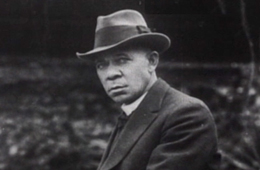Teachers' Domain - Digital Media for the Classroom and Professional Development
User: Preview

Source: The Rise and Fall of Jim Crow: “Fighting Back”
Booker T. Washington and W.E.B. DuBois: The Conflict Transcript (Document)
Booker T. Washington was considered the most influential black educator of the late 19th and early 20th centuries. Washington won the trust of white Southerners and Northern philanthropists by making the Tuskegee Institute into a model school of industrial education. He reassured whites that his educational program did not challenge white supremacy or offer economic competition with whites.
In September 1895, Washington became a national hero to whites when he was invited to speak at the 1895 Cotton States and International Exposition in Atlanta. In his now famous Atlanta speech, Washington publicly accepted disfranchisement and social segregation as long as whites would allow black economic progress, educational opportunity, and justice in the courts. "The wisest of my race understand that the agitation of questions of social equality is the extremest folly and that progress in the enjoyment of all the privileges that will come to us must be the result of severe and constant struggle rather than artificial forcing.”
Washington further publicized himself and his program through his 1901 autobiography Up From Slavery. Presidents Theodore Roosevelt and William Howard Taft, both men with deep racial prejudices, used Washington as an advisor because he accepted racial subordination. He was able to recommend candidates for minor political posts that traditionally were given to blacks. The industrialists who controlled the financing of many black schools in the South depended upon his advice as to which schools should receive funds. In 1903, Washington's policies received a challenge from within the black community. W.E.B. Du Bois, then a scholar at Atlanta University, attacked Washington's philosophy in his book The Souls of Black Folk.
An organized resistance to Washington grew within the black intellectual community. But as far as the majority of middle-class and working-class blacks were concerned, Washington remained their man. His popularity enabled him to neutralize criticism, sometimes by devious means such as bribing newspapers to report false and unflattering reports of his critics. Because of his image as a conciliator, Washington seldom could publicly criticize injustice. Yet, behind the scenes, he did finance court cases challenging segregation and tried to mitigate some of its excesses. When Woodrow Wilson became president in 1913, Washington lost his influence in the federal government, which Wilson helped segregate further. Meanwhile, a new era had begun in the black community, and a younger generation would no longer accept white supremacy. Under the leadership of Du Bois and others, they would demand their political and civil rights.
--adapted from the website The Rise and Fall of Jim Crow
 Loading Standards
Loading Standards